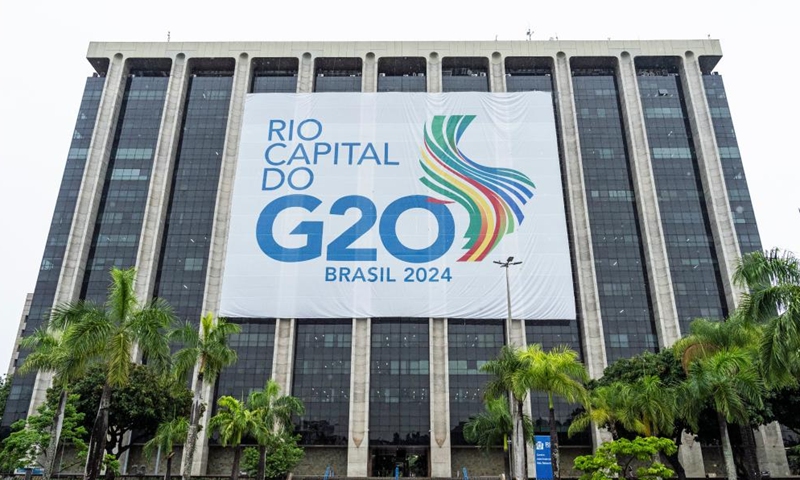G20's focus on development highlights the contributions of the 'Global South': Global Times editorial

This photo taken on Nov. 16, 2024, shows a G20 logo displayed in Rio de Janeiro, Brazil. The 19th G20 summit is scheduled from Nov. 18 to 19 in Rio de Janeiro. (Photo/Xinhua)
The 19th G20 Summit is being held in Rio de Janeiro, Brazil, from November 18 to 19. Chinese President Xi Jinping said at the summit that China has announced the decision to give all the least developed countries having diplomatic relations with China zero-tariff treatment for 100 percent tariff lines. President Xi previously stated that development must be placed at the center of G20 cooperation. This echoes this year's G20 theme, "Building a Just World and a Sustainable Planet," established by Brazil, the G20 presidency. This allows the world to see that this G20 Summit will continue to focus on development issues, leading to more positive expectations from the global community.
The summit has three central topics: combating hunger, poverty, and inequality; addressing climate change with a just transition; and reforming global governance. Two of the three topics are directly related to development, highlighting an important change in the G20 in recent years, that is, it has gradually transformed from an emergency consultation platform for crisis response into a long-term and effective governance mechanism dedicated to promoting a more just, inclusive, and equitable global economic system. Another more important historical change is that the voices of "Global South" countries have become louder, with more demands from developing countries being reflected in G20 agendas. Many in the Western public have also taken note of this shift.
Achieving such a transformation is not an easy task. Especially in recent years, with the rise of unilateralism and protectionism, frictions among various parties have increased, and geopolitical issues have frequently taken the spotlight, squeezing the space for pragmatic cooperation within multilateral platforms. However, the G20 did not go in this direction. As early as the 2016 G20 Hangzhou Summit, China, as the host country, placed development at the core for the first time, effectively promoting the G20's shift from focusing on economic issues to addressing a diverse range of topics, including development. This trend continues to this day. Then United Nations secretary-general Ban Ki-moon commended China for taking the G20 Summit to another level of inclusiveness.
In recent years, China has been promoting such a transformation. For example, it has proposed and advanced cutting-edge agendas such as the digital economy and artificial intelligence, while also introducing topics like green finance. China has consistently upheld true multilateralism, advocating for mutual respect, equal cooperation, and win-win outcomes, effectively countering the interference of unilateralism and protectionism within the G20.
Today, the G20, while focusing on economic and development issues, has further increased its attention to building a more equitable and reasonable global governance system. This has earned the G20 greater credibility and support, making it more vibrant and dynamic. The G20 was born out of crisis, but it has not diminished with the passing of that crisis; instead, it has gradually grown into a cooperative platform dedicated to fundamentally addressing crises. The reason for this evolution is evident: It aligns with the expectations of the vast majority of countries around the world, which is to promote a bright future of peace, security, prosperity, and progress for the world.
The G20's focus on development issues not only helps countries in the "Global South" achieve greater development, but it is also beneficial for Western developed countries. The total economic output of G20 members accounts for approximately 85 percent of global GDP, and their trade volume represents 80 percent of the world's total. This group includes both affluent developed nations and emerging economies that are rising rapidly. We have observed that even some voices in the West, which are often biased, have had to acknowledge the important role of the G20, emphasizing that dialogue on the G20 platform must be prioritized. This is why China has repeatedly emphasized at G20 summits the need to continue prioritizing development and to consistently support and strive to bring development issues back to the core of the international agenda.
From Hangzhou to Rio, development remains the most central topic that garners the most attention at the G20 summits. Achieving greater consensus and tangible results on development within the G20, an important platform for international economic cooperation today, is what all parties expect and what the public desires.
Whether addressing the tensions in global industrial and supply chains, the negative impacts of unilateralism and protectionism, or tackling the effects of the lag in global governance reform on the development of the "Global South," the G20 summit provides a precious opportunity for discussion. All parties should cherish this opportunity, put forward more pragmatic measures, and continuously strive for tangible results.
Photos
Related Stories
- Xi arrives in Brasilia for state visit to Brazil
- Xi says China ready to maintain momentum of steady development of China-France ties
- Xi sends congratulations to 2024 World Internet Conference Wuzhen Summit
- Xi urges a just world of common development, fair global governance amid global crises
- China ready to practice true multilateralism with other G20 members: spokesperson
Copyright © 2024 People's Daily Online. All Rights Reserved.









